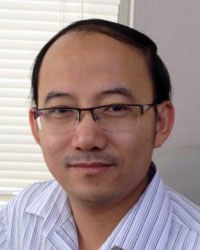GRANT AIMS TO CONNECT DATA FOR HEALTH RESEARCH
April 2023
CU School of Medicine faculty members have been awarded a $1 million grant by the Patient-Centered Outcomes Research Institute to improve understanding household and family connections between patients. Principal investigators on the grant are Toan Ong,
PhD, associate professor of biomedical informatics, and Lisa Schilling, MD, MSPH, professor of medicine.
Electronic health records often include information that, if linked with information about household or family members, could provide
rich and detailed environmental and family history to support scientific discovery and patient-centered outcomes research.
Electronic health records currently do not make such connections. Among the reasons: time constraints for those entering information into the record, systems that are not designed tup support accurate and efficient documentation, and patients without awareness of medica information of their relatives.

Toan Ong, PhD
By making connections, researchers hope to study whether disease might be due to a shared exposure, such as secondhand smoke, or shared genetics, such as heart disease caused by genetics.
In their study, the CU research team is developing and testing new methods to check if two data sets can be linked together. The team is also looking to securely link new data to existing patient data without identifying individual patients.
Ong specializes in patient-linking electronic health records data, which has long been a challenge when patients with multiple chronic conditions who see multiple providers at different institutions. He credits CU’s strong history of building partnerships with making the family-linking project possible.
“The extraordinary research environment at CU Anschutz, which enables meaningful collaborations between faculty, staff, and students in different departments and schools, will be driving force of the execution of this project,” Ong says.
Ten CU researchers will work on the project in collaboration with the U.S. Census Bureau, which will confidentially validate the output of their research methods, and the Rocky Mountain Research Data Center, which will ensure patient privacy and ethical concerns are met. Although the family-linkage methods will not be used in patient care, Ong says the work will indirectly benefit patients by improving the quality of health data available for research and providing transparency in linking family data for research.
In their study, the CU research team is developing and testing new methods to check if two data sets can be linked together. The team is also looking to securely link new data to existing patient data without identifying individual patients.
Ong specializes in patient-linking electronic health records data, which has long been a challenge when patients with multiple chronic conditions who see multiple providers at different institutions. He credits CU’s strong history of building partnerships with making the family-linking project possible.
“The extraordinary research environment at CU Anschutz, which enables meaningful collaborations between faculty, staff, and students in different departments and schools, will be driving force of the execution of this project,” Ong says.
Ten CU researchers will work on the project in collaboration with the U.S. Census Bureau, which will confidentially validate the output of their research methods, and the Rocky Mountain Research Data Center, which will ensure patient privacy and ethical concerns are met. Although the family-linkage methods will not be used in patient care, Ong says the work will indirectly benefit patients by improving the quality of health data available for research and providing transparency in linking family data for research.